
Am I the only one who’s beyond weirded out by the fact that there’s only one legal recreational drug? It’s shamelessly pushed down our throats, and what does it do? It binds us here and keeps us stupid; that’s what it does. It’s called mind control my friends, pure and simple. You can drink booze! It’s all over the fucking place. There are literally billions of potential recreational compounds which we could choose as the foundation for our cultural activities, and that’s the one we get. You’ve got to stop thinking this makes any sense. I’ve always joked that if you want to get paid playing music, you should start a cover band. The reason is simple: the game’s been rigged. Clubs make their money off booze and drunk people want to hear songs they already know and can sing along with. Hell, I do when I’m drunk.
Timeless states of being are always within our reach through the use of psychoactive substances, meditation, breathing exercises, dream manipulation, and other natural methods — but it’s also nice to know that Midday Veil frontwoman Emily Pothast’s fledgling record label, Translinguistic Other, is on the forefront of helping you achieve them with even greater ease through sonic invocation.
I caught up with the prolific Miss Pothast (pronounced like “hottest”) to discuss some of these topics, and some other stuff that happened to be going through my head when I drew up the questions. I was kind of drunk.
Q&A With Emily Pothast, Translinguistic Other Founder & Midday Veil Vocalist
I first became interested in Gnosticism when I was living in a part of Texas that is completely dominated by fundamentalist Christianity. I knew the dominant culture was fucked, but I didn’t feel like it was useful to be completely dismissive of the religious mythologies that held so much resonance for these people. I wanted to know where these ideas came from and to see if I could learn something about the patterns behind them.
— Emily Pothast, on mysticism
Didn’t you tell me once that you had some kind of experience where you went out-of-body because you electrocuted yourself with some of your gear during a sound check? Talk about that a bit.
Yep. It had to do with a short in an amplifier and a building with old wiring. It was super weird. My lip touched the microphone, and everything went completely white. Whatever electromagnetic integrity holds my consciousness together was completely overridden by the strength of the current, and for a brief moment, I became a passive conduit for electricity. I felt my “self” taking the form of the wiring of the building and reaching out into the electrical grid beyond. And then I came back. It was over within a matter of seconds.
 Any other odd spiritual experiences you’ve had that you’d go on record with? They don’t have to be drug or electrocution-related. Aren’t you rather interested in Gnostic Christianity, The Red Book by Jung, etc.?
Any other odd spiritual experiences you’ve had that you’d go on record with? They don’t have to be drug or electrocution-related. Aren’t you rather interested in Gnostic Christianity, The Red Book by Jung, etc.?
In general, I’m interested in the mystical strains of various religions because they tend to emphasize direct experience over dogma. I first became interested in Gnosticism when I was living in a part of Texas that is completely dominated by fundamentalist Christianity. I knew the dominant culture was fucked, but I didn’t feel like it was useful to be completely dismissive of the religious mythologies that held so much resonance for these people. I wanted to know where these ideas came from and to see if I could learn something about the patterns behind them. So I started looking into the history and politics of early Christianity, which led me to Gnosticism1, which is far too broad of a topic to get started on here — but yeah, it’s super interesting.
As far as my personal history of spiritual experiences, the big one would be losing my parents in a car accident in 2005. I was really close to my family — especially my mom — and that experience just threw me into this incredibly deep and infinitely painful abyss, which ended up being very transformative for me as an artist. Pretty much all of the assumptions I had about life before that point collapsed and everything I have done since then has been rebuilt in the shadow of that experience. The album Eyes All Around is about that process of going through hell and eventually coming through the other side.
Jung’s The Red Book is endlessly fascinating to me because he also went through a very harrowing period personal crisis, except his had a spontaneous onset. The The Red Book was his personal journal where he recorded all kinds of visions he had during that time, which essentially amount to prophecy, both visual and literary. He went in a psychiatrist and came out a prophet.
Midday Veil are about to go into the studio and work on another more song-oriented outing right? Plug away.
Yep, Midday Veil are about to go into the studio with Randall Dunn and record our second full-length album. It will consist of some stuff you’ve probably been hearing us play live for the past few months, and some other things that are very much still in flux. I’m excited because I think the new stuff really represents the band coming into its own.
Didn’t you guys record some stuff in The Integratron2? That’s one of the cooler ideas I’ve ever heard. How’d that go? Any weirdness?
Aw, thanks! The Integratron is amazing. The building is incredible and it’s situated on a geomagnetic vortex, supposedly. They also do healing sound baths with these quartz crystal bowls that are designed to resonate with the frequencies of the room, so you can feel the sound coming through your body like a physical current. If you go, you definitely need to get one of the sound baths!
As far as weirdness beyond the inherent weirdness of being there, I didn’t feel any. We did make some recordings in there but we’re still sorting out what to do with them. They have some incredible moments, but we didn’t multi-track, so we just have room mic recordings and a big part of the amazingness of The Integratron is the way it actually feels to be there. The acoustic properties are very strange. The sound travels in unexpected ways. Learning to play music inside The Integratron is like learning to play a completely new instrument! So whatever happens with the stuff we have, I think I’m definitely interested in making another trip down there at some point to see if we can’t figure out a way to record more spatially in order to really get a sense of what it’s like to be in the space.
How do you feel about how the drug war influences the culture surrounding our music scene? Do you ever find yourself wishing you could shill something other than booze legally? Any thoughts on the ridiculously high prevalence of alcohol problems among musicians?
Well, I don’t feel like it’s my position to shill booze or anything else (except records!), but it’s true, nearly all of the legitimate music venues in Seattle are bars first and venues second, so I guess everyone in a band that plays those venues shills booze indirectly. The bars make money off selling alcohol, which no doubt influences the music that gets played and promoted and also probably encourages musicians to drink more than they would if they weren’t hanging out in that kind of environment all the time. It would be an interesting experiment to play music in a club that just served pot brownies, for instance, and see how that changed the overall contours of the experience. It would be very different.
“I think the idea of having songs that are completely set in stone is a little like having a supreme deity who created the world exactly as it is, static and unchanging. Charting the development of themes in linear time, or intentionally building toward a climax is, in fact, a very idiosyncratic and Western way of looking at music. But if you take a longer, wider look at the history of humans making music, you find strong traditions all over the world of music that unfolds around a central point and illuminates the contours of a single eternal moment.”
— Emily Pothast, on spontaneous creation
2011’s Escalator Fest3 featured like 2 bands (out of 10, Midday Veil and Rose Windows) that I would say wrote “actual songs” by any conventional definition of the word. Both of these new releases on your label are based on spontaneous experimentation. What are your thoughts on the importance of spontaneity in the creative process, as it’s obviously something you pursue?
I definitely pursue improvisation in my process and am most drawn to musicians who also practice a certain kind of cultivated spontaneity. The four core members of Midday Veil have been playing together for almost three years now, and our process has definitely matured a lot. Early on, I had some songs that I had written on my own that we adapted for the full band, but now when we write songs together, it’s generally something that starts as an improvisation and gets refined over time.
To me, there is always something magical about the very first time a melody or rhythmic idea emerges, and so on some level, taking an idea beyond that initial improvisation is always a little like trying to draw a picture of a bolt of lightning from memory. (That’s why, as far as my personal tastes go, Subterranean Ritual II is the most exciting thing Midday Veil has released so far.) But we’re also working on bringing some of that spontaneity into more recognizable song structures by creating compositions that are a framework for improvisation to unfold in. Like, this is the shape and color of the tent, but what happens inside the tent is always a little different.
For me, that interest comes right back to your other question about spirituality. I think the idea of having songs that are completely set in stone is a little like having a supreme deity who created the world exactly as it is, static and unchanging. Charting the development of themes in linear time, or intentionally building toward a climax is, in fact, a very idiosyncratic and Western way of looking at music. But if you take a longer, wider look at the history of humans making music, you find strong traditions all over the world of music that unfolds around a central point and illuminates the contours of a single eternal moment. For me, that expansion of time is the essence of psychedelic music. Music is art that unfolds in 4 dimensions, and psychedelic music is psychedelic insofar as its ability to imply dimensions beyond that.
I’m interested in music that explores, but first goes to the trouble of setting up good conditions for exploration. Set and setting. Then it becomes more about the journey than any particular destination.
Is this maybe a subtle way to encourage different, maybe healthier choices in chemical consumption among the listeners? Clubs themselves won’t make dick on any of that unless the laws change.
Well, Fungal Abyss are very open about the fact that, for them, the process of getting into that meditative, creative headspace involves mushrooms that are currently illegal in the United States, despite the fact that they were deemed sacred by many of the indigenous people we stole this continent from. But ultimately, we [at Translinguistic Other] put out their album because the music is excellent, not because we have any agenda of encouraging one drug over another. The shroom thing might inspire some people to turn on and tune in, but other people it will probably just use it as an excuse to completely dismiss it before giving the music a chance. However people choose to react, I think that says more about them than it does about the label or about Fungal Abyss. I think it’s my job to help put the art I want to see out into the world and try not to worry too much about what other people do with it in their free time.
From Improv To Tape: Recent Releases On Translinguistic Other
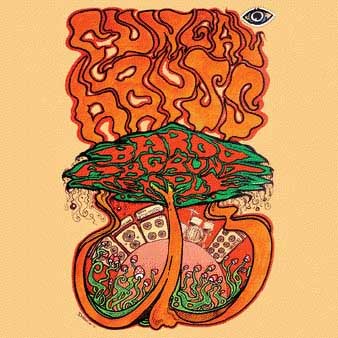
Fungal Abyss — Bardo Abgrund Temple
Every time I take mushrooms, I personally experience a similar sensation of a veil lifted and a world of guitar noise, cresting electronics, and godhead reverb echoing eternally behind the scenes of our manufactured reality. I feel this is relevant information when discussing an album by Fungal Abyss, Seattle epic metal dudes Lesbian’s mycology-obsessed free-form psych project.
Members of Lesbian were in a crazy technical spazz-core band called The Abodox and have been practicing their instruments obsessively for decades now. Despite this, they’re smart enough to know that when free-from riffing on the fly, it’s best to keep things insanely simple as to avoid glaring fuck ups.
Most of the tracks on Bardo Abgrund Temple are little more than a base primal drumbeat laced with no nonsense fills and a bunch of same key effected guitar noise layered on top. In fact, that’s pretty much what the entire first 20-minute “song,” “Arc of the Covenant,” is. It’s cool for sure, and reminds me of bands like say late nineties/early ‘aughts Bardo Pond sans vocals. Not honestly what you’d expect from the Lesbros. Dudes are choppier than a schooner ride through hurricane waters — and they’re toning things down on that front quite a bit here. On the plus side, they’re not singing for once, which is a bonus, and there’s exactly zero bullshit metal posturing. So its way chiller vibes than what they thrown dow in their main project.
In my mind, the album, which is over an hour long, peaks on the song “Time of Bones,” when one of the guitar players remembers: “Oh shit, yeah, I can shred,” and proceeds to drop some light speed blues licks for a spell. Or is it the song “Timewave Zero,” which references in title and then actually samples the immortal Terence McKenna? You can never go wrong with shit like that, and you know what, you can stream the entire thing online for free (see below or visit their Bandcamp) but you can’t buy it as a download for some reason.
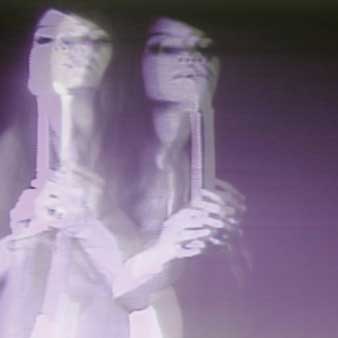
Midday Veil – Subterranean Ritual II
You might also want to grab Midday Veil’s Subterranean Ritual II on Amazon, because it’s less than $2 for a 35+ minute record. The Veil have been pursuing the art of spontaneous musical channeling from the jump, and you should be able to tell just from the cassette’s moniker that it’s their second foray into cutting free-form experimentation to tape. It definitely works better than the first, due to longer song lengths, less instinctual vocal outbursts and more focused intentions.
The first track, “Moon Temple,” starts off meditative, turns tribal, and unsurprisingly peaks at the end when guitarist Timm Mason drops some staccato fret board shred-i-tude for a few sustained minutes. It’s what the whole track seems to be building to and when it hits, your mind is taken to a wondrous level of sublimely blown. It’s probably the most structural moment on the tape, where years of scale worship bear luscious rewards. The next track, “Naxos,” is ominous in tone and kind of doesn’t go anywhere much but sounds spiritual nonetheless. You just kind of think its building to a crest like the first song, but it never comes. Interesting in a sound-tracky way for sure and makes me think about performing arcane internal rituals in a cathedral at dawn while the sun drenches my spirit with life rejuvenating energy. Good, but in a background music kind of way.
The thing about Midday Veil is, they’re one of the few psych bands writing actual songs these days, which sets them apart from the pack. Their strength rests largely on the potency of Miss Pothast’s pipes which are wisely restrained to background ambiance here. Trippy improv albums are fun, but I’m more looking forward to their next studio outing which will most likely feature something I won’t be able to shake out of my head after the music ends. Then again, maybe that’s just the drunk in me talking. That dude never shuts up.
Upcoming Releases On Translinguistic Other
Swahili – Self-Titled (LP)
“This album is all about non-stop beats constantly pounding their way into your aura and boldly warping your thought patterns. These guys aren’t huge on melody, but when the witch vocals kick in on the album’s true stand-out track, “Soma,” it’s the kind of unholy sacrament that communicates the presence of the divine uncanny and makes the hairs on the back of my neck stand at attention. The rest of the album is dense with succulent pulsing rhythms, calculated keyboard mindfuckery, and otherworldly dream incantations.” — Full Album Review
Dictionary Of Terms
1 Gnosticism (from gnostikos, “learned”, from Greek: γνῶσις gnōsis, knowledge)
A scholarly term for a set of religious beliefs and spiritual practices common toearly Christianity, Hellenistic Judaism, Greco-Roman mystery religions, Zoroastrianism (especially Zurvanism), and Neoplatonism. A common characteristic of some of these groups was the teaching that the realisation of Gnosis (esoteric or intuitive knowledge), is the way to salvation of the soul from the material world.
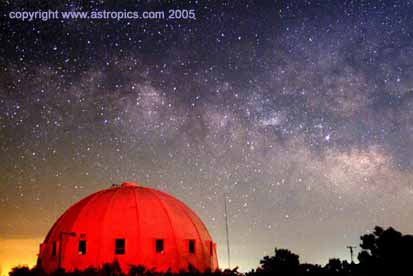 2 The Integratron
2 The Integratron
PHOTO CREDIT (R): The Milky Way over the Integratron by Wally Pacholka
A space in Southern California, self-described as “an acoustically-perfect tabernacle and energy machine sited on a powerful geomagnetic vortex in the magical Mojave Desert… The Integratron is the creation of George Van Tassel, and is based on the design of Moses’ Tabernacle, the writings of Nikola Tesla and telepathic directions from extraterrestrials. This one-of-a-kind building is a 38-foot high, 55-foot diameter, non-metallic structure originally designed by Van Tassel as a rejuvenation and time machine. Today, it is the only all-wood, acoustically perfect sound chamber in the U.S.”
(Source: www.integratron.com)
3 Escalator Fest
A multiple-day festival of psychedelic music, which has taken place annually in Seattle, Washington, since 2009.
(Source: www.escalatorfest.com)



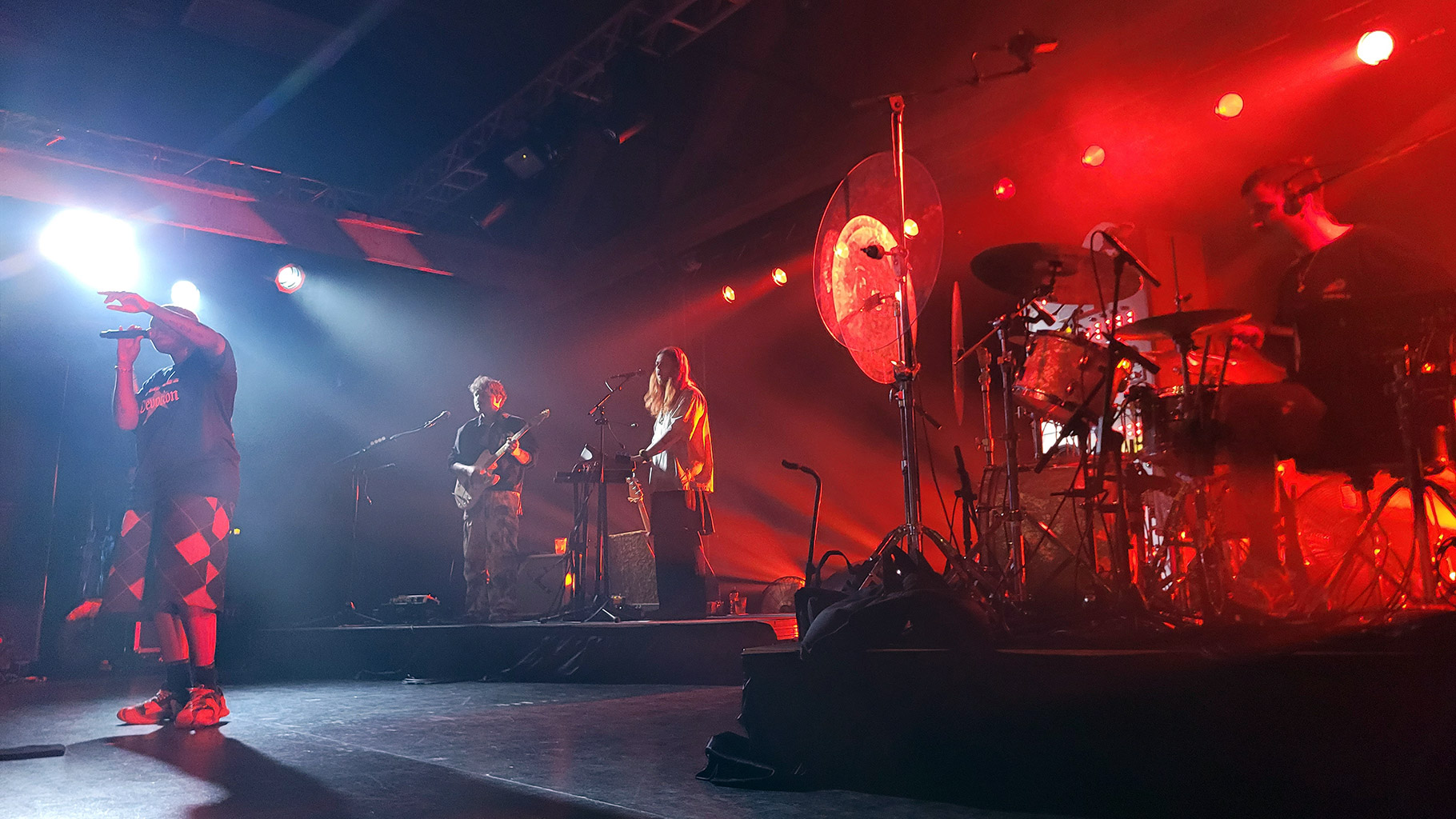

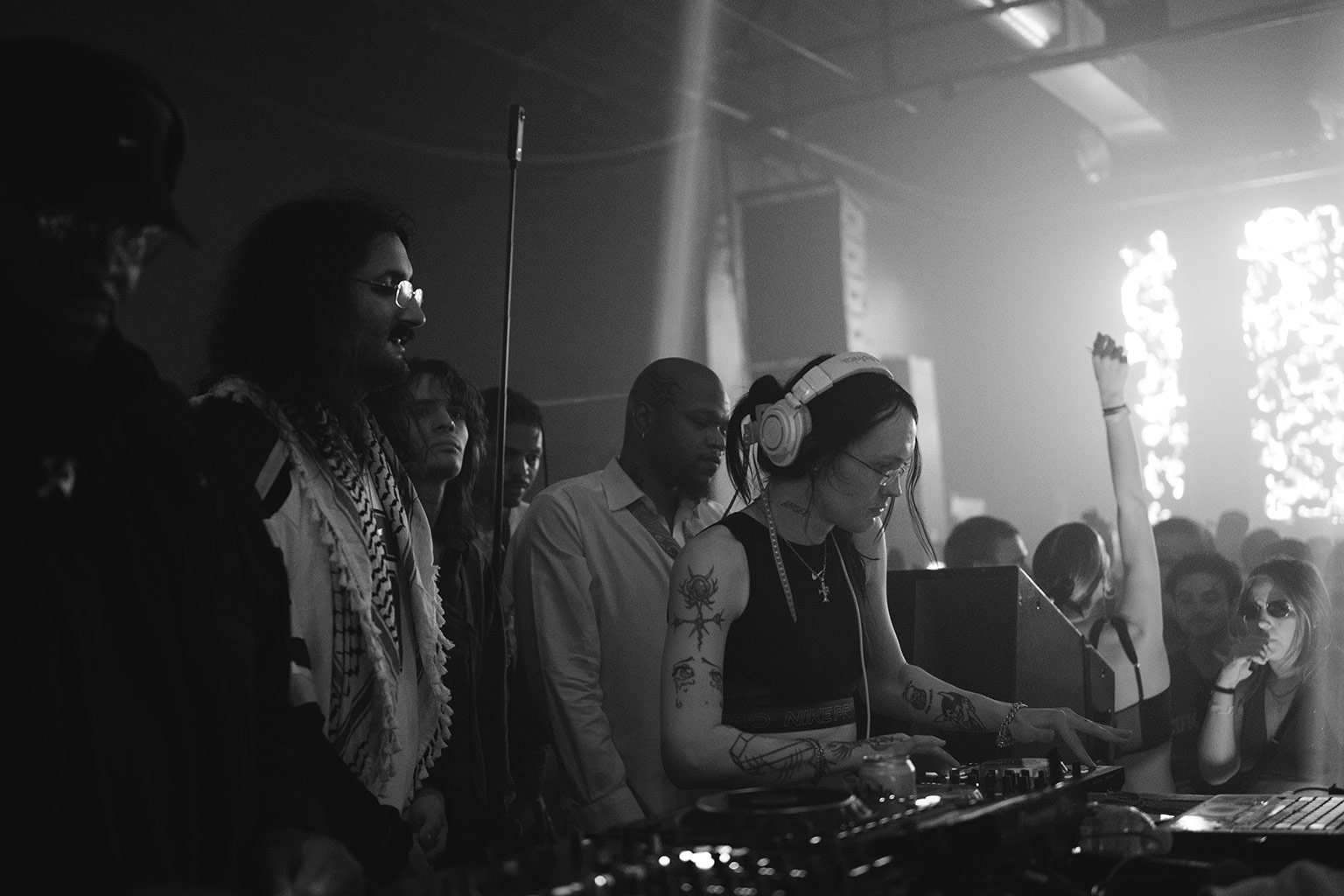
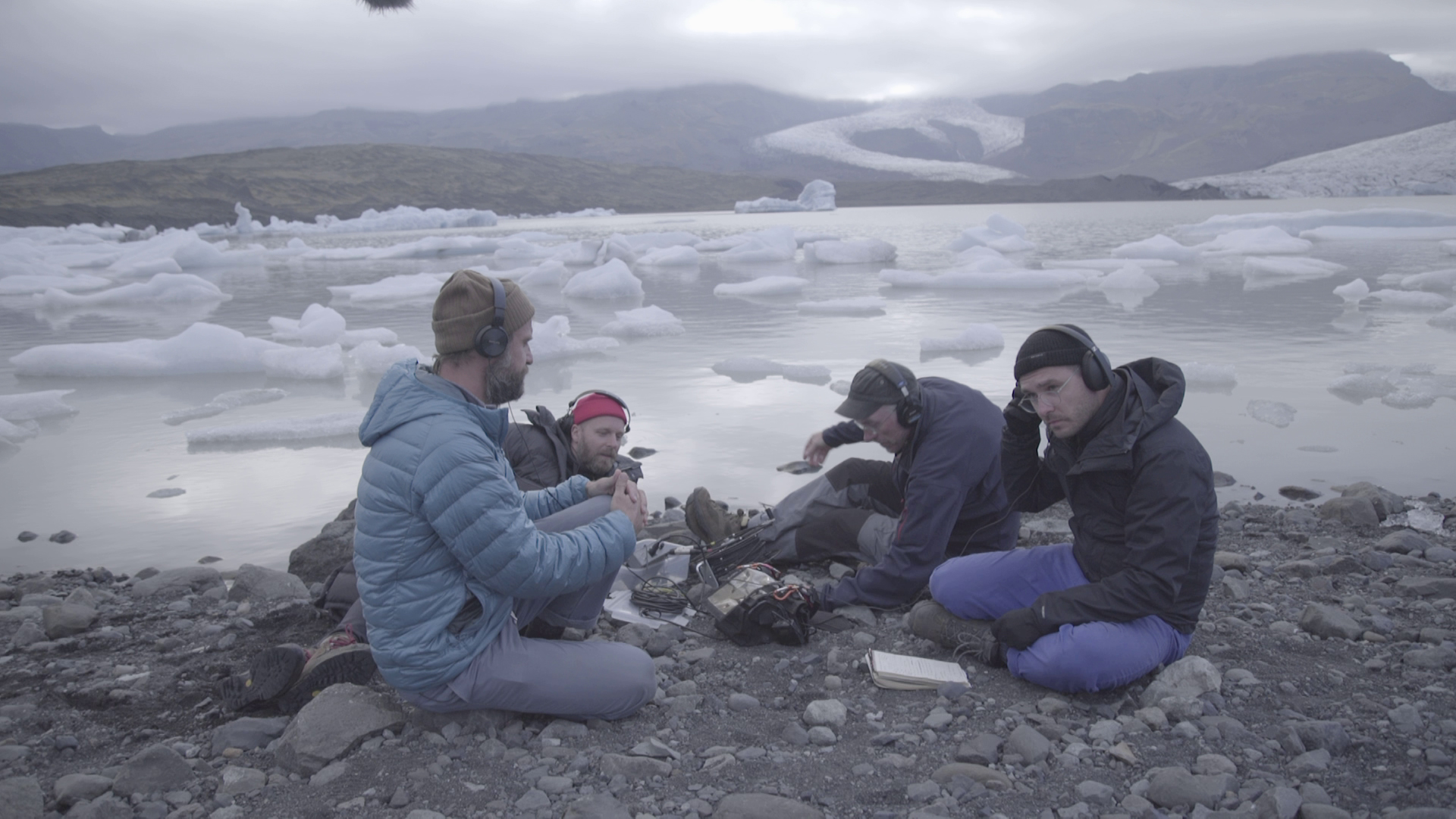
[…] & the Sacred Ensemble. Translinguistic Other was just the subject of a rad interview from Redefine Magazine, check it out if you haven’t! And then get on over to ENTHEO SOUND for all your […]
[…] and 9:00pm. Included among the artists and performers are REDEFINE favorites like Midday Veil (interview +exclusive MP3 download) and creator of Le Petit Prince Troy […]
[…] etc. who are currently changing the conscious landscape of the divine Holy Spirit. First nominee? Emily Pothast (rhymes with hottest) from the band Midday Veil. I don’t get psychic impressions about people […]